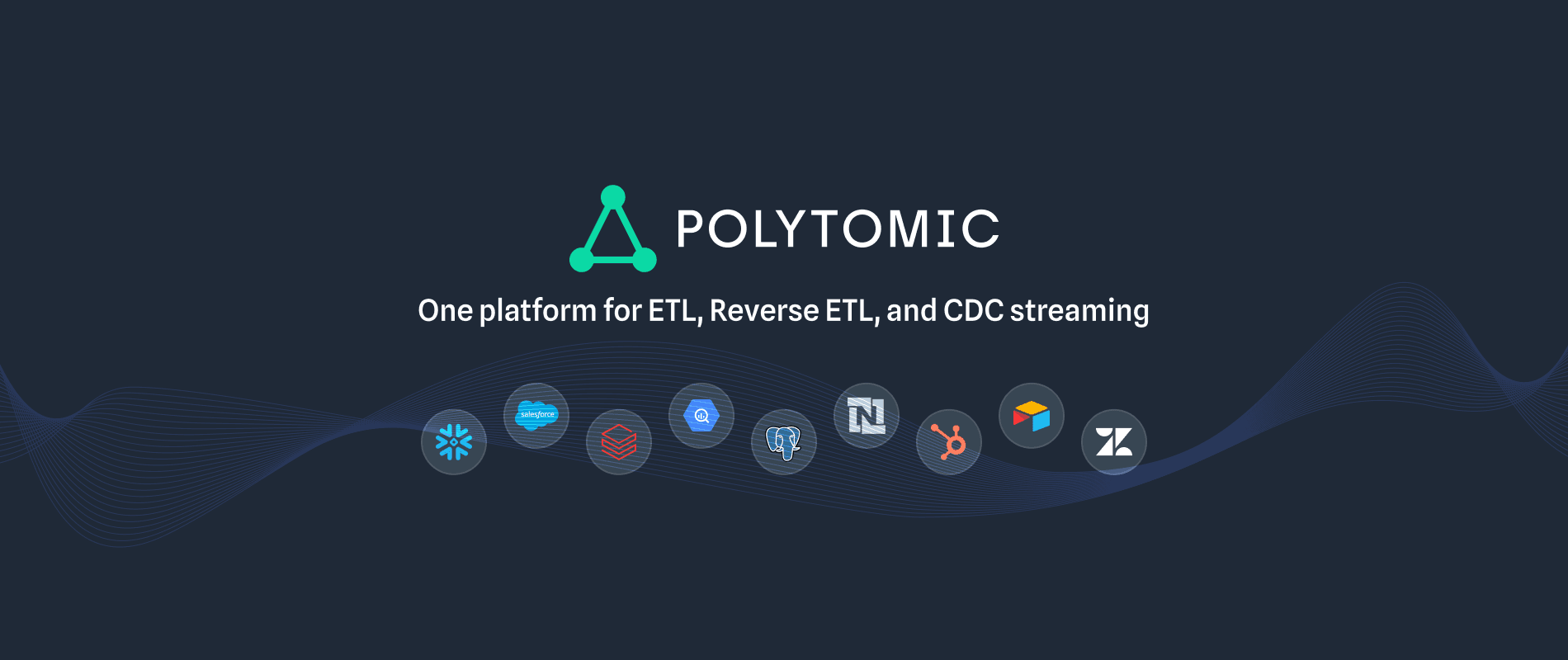Top 6 Integrate.io Alternatives & Competitors
Integrate.io is a cloud-based platform offering ETL, ELT, Reverse ETL, and CDC capabilities with a low-code interface for building and managing data pipelines, catering to various data operations.

What is Integrate.io?

Integrate.io
Integrate.io is a cloud-based platform designed for data integration, featuring ETL, ELT, Reverse ETL, and small-scale CDC functionalities. It offers a user-friendly, low-code interface that simplifies the creation and management of data pipelines, addressing a wide range of data operation needs.
Key Features
- ETL/ELT: Sync to data warehouses
- Reverse ETL: Sync from data warehouses
- Ideal for small data scale
Limitations
- Restricted support for SQL and code
- Less dependable at scale
- Constrained API capabilities
Pricing
Integrate.io provides a straightforward pricing structure with its Core plan available at $1,999 per month. This plan encompasses unlimited data volumes, pipelines, and connectors, granting full access to the platform and a 60-second pipeline frequency. For those requiring more advanced features and personalized support, custom plans are also offered.
Why Consider Integrate.io Alternatives
While Integrate.io seems comprehensive, it has its limitations that prompt users to explore more reliable alternatives. Here are some reasons why companies might look elsewhere:
- Limited Support for SQL and Code: Integrate.io's interface is user-friendly, but it offers limited flexibility for those who prefer to write custom SQL queries or code. This can be a drawback for advanced users who need more control over their data transformations.
- Less Reliable at Scale: Users have reported that Integrate.io can become less reliable as the volume of data increases. This can lead to performance issues and delays, which are critical concerns for businesses handling large datasets.
- Limited API: The platform's API capabilities are somewhat restricted, making it challenging to integrate with other tools and systems seamlessly. This limitation can hinder the automation of workflows and the overall efficiency of data operations.
Below is a table breaking down six alternatives to Integrate.io and their tradeoffs.
Feature-by-Feature Breakdown: Alternatives & Competitors
































































































Top 6 Integrate.io Alternatives & Competitors
Polytomic
Data teams appreciate our single ETL platform with unified monitoring to centralize all data movement. We have full SQL support and first-class support for infrastructure-as-code.
RevOps and marketing teams use our no-code UI to quickly and independently set up syncs for product data to their CRM and ad platforms.
Built for enterprise scale, Polytomic can be self-hosted, handles billions of rows reliably, and has multi-tenant workspaces with fine-grained access controls.
















All the features you need, on the platform that does it all
Replace multiple vendors
Reduce costs and simplify workflows
One platform for all syncs
ETL, Reverse ETL, CDC, iPaaS, APIs, and spreadsheets
Sync only what's changed
Save on API limits and compute costs
Point and click
Select and filter your data without writing code
SQL query support
Powerful transformations when you need them
Pull from any API
No more glue code for custom integrations
Self-hosting available
Turnkey deployment to your private cloud
Enterprise-ready
SOC 2, GDPR, permissions, and audit logs
Integrated with your favorite tools
Sync any of your proprietary data from databases, data warehouses, and spreadsheets to the business systems you use.








Pricing begins at $500/month
Standard
Everything in Basic, plus:
- Sync to and from databases, warehouses, spreadsheets, apps, and APIs
- Unlimited users and connections
- Multiple sync destinations
- Live chat support with engineers
Enterprise
Everything in Standard, plus:
- On-prem deployment
- Single sign-on (SSO)
- Dedicated engineer
- Phone support

Fivetran
Fivetran is a widely-used ETL solution designed to transfer data from various sources such as SaaS applications, databases, and files into data warehouses including Snowflake, BigQuery, Databricks, and Redshift. It automates the data integration process, ensuring that data is consistently and accurately moved to the desired destination, enabling businesses to focus on analysis rather than data pipeline maintenance.

Key Features
- Widely-known ETL vendor
- Large number of built-in connectors
- Plug-and-play syncing into data warehouses
- Simple to use for smaller businesses
Limitations
- Unable to sync back into SaaS applications (no Reverse ETL)
- Frequent price increases
- High cost at medium scale and beyond
- Limited and unreliable customer support
- Slow response to new connector requests
Pricing
Fivetran provides several pricing tiers to accommodate different needs. Their Free Plan is available at no cost, while the Standard Plan is priced at $500 per million monthly active rows (MAR). For more extensive requirements, the Enterprise Plan costs $667 per million MAR, and the Business Critical Plan is set at $1,067 per million MAR. As of March 2025, Fivetran's bulk sync discounts are applied on a per connector basis rather than across the entire workspace, which has led to higher costs for many users.

Airbyte
Airbyte is a versatile open-source data integration platform aimed at centralizing data across warehouses, lakes, and databases. It provides various options such as Airbyte Cloud for rapid deployment, Airbyte Self-Managed Enterprise for robust data security, and Airbyte Open Source, trusted by more than 40,000 organizations. This flexibility makes it a go-to solution for diverse data integration needs.

Key Features
- Transfer data from various systems to data warehouses (ETL)
- Extensive range of built-in connectors
- Self-service capabilities
- Vibrant open-source community
Limitations
- Many connectors are only “community-supported”
- Complicated setup procedures
- Fragile and underdeveloped at scale
- Incapable of transferring data from warehouses to SaaS applications (No Reverse ETL)
Pricing
Airbyte provides several pricing tiers to cater to different needs. Their offerings include a free Open Source plan for those who prefer self-hosting, a Cloud plan that charges based on data volume, and Team and Enterprise plans that are capacity-based. Each plan differs in hosting options, sync frequency, and additional features. The Cloud plan may incur additional costs for more frequent syncs, while the Team and Enterprise plans come with various add-ons to enhance functionality.

Rivery.io
Rivery.io is an ETL/ELT solution for small scale data movement across systems. Their pre-configured connectors and accommodates both code-based and no-code approaches for constructing data pipelines to data warehouses.
Key Features
- Sync to Warehouse (ETL/ELT)
- Ideal for small data scale
Limitations
- Limited to ETL processes, lacking Reverse ETL capabilities
- Scalability issues, not dependable for large-scale operations
Pricing
Rivery.io's pricing model is usage-based, calculated in BDU credits, with an initial rate of $0.90 per credit. They provide four distinct plans: Base (free), Professional, Pro Plus, and Enterprise. Each plan offers different features, including the number of environments, user access, and sync frequencies. Higher-tier plans come with enhanced capabilities such as high-frequency syncs and advanced security features.

Census
Census is a Reverse ETL tool designed to transfer data from your data warehouse to various SaaS applications, including Salesforce, Hubspot, and advertising platforms. This enables businesses to leverage their data more effectively by ensuring that critical information is consistently updated across all operational tools.

Key Features
- Sync from data warehouse to tools (Reverse ETL)
- Workspaces
- White-label API
Limitations
- Limited number of synced fields for Professional plan
- Pricing model not based on scale (per field pricing)
- Enterprise plan needed for syncs more frequent than 15 minutes
- Inability to sync to data warehouses (No ETL/ELT)
Pricing
Census offers three main pricing plans: the limited free plan, a Professional plan starting at $350/month, and custom Enterprise plans. The Enterprise plan is required for real-time sync capabilities and their “Audience Hub” features.

Hightouch
Hightouch is a reverse ETL and AI platform tailored for marketing and personalization, empowering businesses to extract insights, execute campaigns, and develop AI-driven agents using their data. It features an AI Decisioning Platform for lifecycle marketing and a Composable Customer Data Platform (CDP) that is adaptable, secure, and rapidly deployable, all built on top of a data warehouse.

Key Features
- Sync data with Reverse ETL
- Emphasis on AI features and marketing personalization
- Free tier to get started
Limitations
- Does not support syncing to data warehouses (No ETL)
- Excess features and pricing for just Reverse ETL
- Lack of unlimited workspaces
Pricing
Hightouch provides a Starter Plan that includes a free tier at no cost and a paid tier priced at $350 per month, billed annually with a 20% discount. For larger organizations, the Business Plan offers custom pricing designed to meet specific requirements, featuring unlimited user seats and advanced personalization options.
Why customers are switching to Polytomic
When Integrate.io’s no-code flows hit their ceiling with limited SQL, constrained APIs, and reliability drop-offs at scale, teams graduate to Polytomic..
Polytomic combines ETL, Reverse ETL, and CDC streaming in a single platform so you can move data to and from your data warehouse reliably at terabyte-scale.
- Loved by Data Teams: One single vendor for all ETL and Reverse ETL, covering high-scale CDC streaming, full SQL support, and Terraform integration.
- Easy for RevOps and Marketing: Point-and-click pipelines with power-user features like real-time SOQL transformations on Salesforce and native integrations with ad platforms.
- Integrations Powering AI Agents: White-label API with native clients for unified ETL; deep integrations with your customers’ GTM stack, finance tools, and data warehouses with fully managed authentication.
- Enterprise-ready: Self-hosting option, multi-tenant workspaces, fine-grained RBAC permissions, high scalability, and 30–50% cost savings from platform consolidation. Plus, support from engineers—in minutes, not days.
Get hands-on with Polytomic
See how easy it is to sync data to the tools your team actually uses—no code, no waiting.
